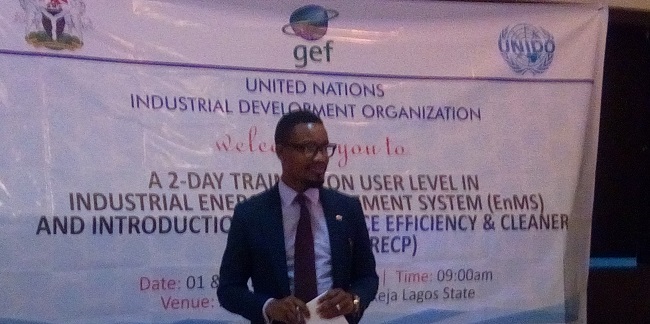The Federal Government is collaborating with the United Nations Industrial Development Organisation (UNIDO), to reduce carbon emissions in industries in Nigeria.

Mr. Oluyomi Banjo, National Programme Coordinator – Environment and Energy UNIDO sub-regional for Nigeria and ECOWAS, stated this at a Phase two workshop for media stakeholders on Thursday, December 19, 2024, in Abuja.
The workshop was organised by the Manufacturers Association of Nigeria (MAN) under the Nigeria Resource Efficiency and Cleaner Production (RECP), and Industrial Energy Efficiency (IEE) Project.
Banjo said that, globally, industries accounted for one-third of total energy consumption and for almost 40 per cent of worldwide Carbon (CO2) emissions.
“The International Energy Agency (IEA) has emphasised that industries will need to reduce their current direct emissions globally by about 24 per cent in comparison to 2007 levels.
“The need to reduce energy consumption, environmental degradation, and resource depletion by industries in emerging economies is especially evident.
“This is so because global growth in industrial production since 1990 has been dominated by emerging economies like India and China.
“Both of which accounted for over 80 per cent of increased industrial production during this period,” he said.
He said that the outcome of the RECP-IEE project was targeted at industries to develop an expert base for Nigeria, which could also be exported to other countries in Africa and beyond.
“This project will address to a good extent the questions on how industries can improve their efficiency, increase profitability, operate at international best standards, comply with regulations and maintain improved relationship with policy makers,” he said.
According to Banjo, a pilot financing RECP-IEE scheme is being executed through the Bank of Industry in Nigeria.
“We hope to support not less than 70 industries across five sectors of food and beverage, wood and furniture, steel and metals, textiles and garment and petrochemicals.
“We will develop the capacity of the Organised Private Sector and develop not less than 300 Nigerian RECP-IEE experts,” he said.
He said that UNIDO had implemented industrial energy efficiency in over 18 countries around the world and had also implemented resource efficiency and cleaner production in over 60 countries.
Banjo said that UNIDO would continue to ensure that the project was effectively implemented and delivered to the Nigerian people.
He congratulated the media for the important role they play for the development of economic, industrial and environmental sustainability that would be further enhanced by the training.
“We will continue to prioritise the media sector and their role towards inclusive and sustainable industrial development in Nigeria,” he said.
In a presentation, an IEE expert, Mr Owoeye Olakunle, ECOwatt Nigeria Ltd., said that the principal aim of the project was to support industries to aligned their operations with RECP- IEE methodologies.
He said that this would facilitate efficient use of energy and resources and helped to minimised environmental impact, energy consumption and production cost while maximising profitability.
Olakunle said the project also aimed to improve enterprise environment performance under RECP best practices within selected small, medium and large-scale industries enterprises in Nigeria.
By Doris Esa
